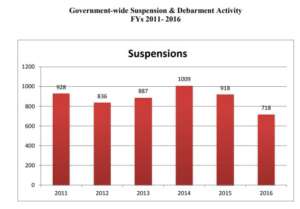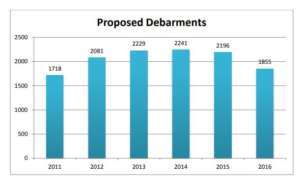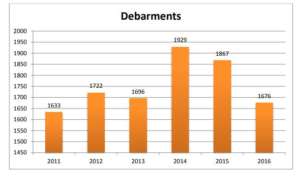
4 trends driving more suspension, debarment of vendors
Jonathan Aronie, a partner with Shepperd Mullin, said agency suspension and debarment officials are asking vendors more questions when non-acquisition issues ar...
The data from fiscal 2017 on the number of suspensions and debarments is not out yet, but federal procurement attorneys suspect the three-year decline will end.
It’s not that more federal contractors did the government wrong in 2017, or even the laws governing suspension and debarment proceedings changed. Rather, procurement attorneys say the government is more aggressive in areas that were once rarely part of suspending and debarring officials’ discussion.
“I noticed in my experience that I was seeing suspension and debarment in places I had not seen them before, like at the end of a routine False Claims Act case. I’ve found it to be more likely to get a show cause letter than it used to be the case,” said Jonathan Aronie, a partner with Shepperd Mullin. “I went about looking to see if my experience was illustrative with what was going on in community generally and looked at the data and saw the trends.”
Aronie found the suspension and debarment officials were more likely to send letters based on:
- Stories in the media
- Suffering a data breach
- False Claims Act settlements
- The actions of an individual in a company should they get in trouble for something that has nothing to do with the business or contracting efforts.
“Suspension and debarment officials are not looking at guilt or innocence, but saying ‘we are seeing something and want to know if we should be afraid or not so come in and tell us,’” Aronie said. “SDOs are pretty good at letting the other processes run their course before making a decision, but they want to be alerted early on so they can track it and stay up to speed. SDOs are being more vigilant about things that, in theory, could harm the government’s interest. I don’t mind getting a question about a newspaper article, but I certainly wouldn’t expect someone to be suspended or debarred because of it.”
Congress has encouraged the Justice Department to become more aggressive over the past decade in holding contractors accountable. Suspensions rose to more than 1,000 and debarments increased to more than 1,900 in 2014 before tailing off in 2015 and 2016.
Aronie and others say agencies are issuing more “show cause” notices, meaning the vendor must tell the government why they shouldn’t be suspended.
Rob Burton, a former Office of Federal Procurement Policy deputy administrator and currently an attorney with Crowell & Moring, said the show cause notice gives the vendor an opportunity to present their case or rebut the allegations, while a notice of suspension or proposed debarment is a de facto debarment.
“It’s a nuisance, but you will not be irreparably harmed like you would be by a notice of proposed debarment,” Burton said. “OFPP and Congress should be touting the use of the ‘show cause’ process and encouraging more agencies to use it. The last thing they should issue is a notice of proposed debarment based on any of those reasons.”
Aronie said for many of these trends suspension and debarment officials want to see corrective actions or other steps the vendor took to stop these problems from happening again.
Bill Shook, a long-time procurement attorney who runs his own firm, said the trends are worrisome for several reasons.
Take the False Claims Act settlement trend as one example. He said usually in a settlement the party that is paying the fine and the DoJ agree not to identify any fault as part of the agreement.
“But with suspension and debarment officials, now you have to prove why you are presently responsible even though the False Claims Act issue happened years ago?” Shook said. “It’s a further criminalization of the procurement process where companies have to endure the requests for additional data in order to prove they are capable of doing business with government. It’s a paperwork process. I’ve sat with a company that is better equipped to do government contracts and they went through the False Claims Act process to get rid of attorney’s fees. Then the SDO asks for all of these records, and because debarment is capital punishment, you have to kiss the ring. That’s what’s happening with officials.”
Shook takes his argument that suspension and debarment officials are exercising their power in a more aggressive manner by calling them “super contracting officers.”
“If you think about it, the contracting officer has the authority to determine the responsibility of a proposed awardee,” he said. “So SDOs are now assuming a greater role of super contracting officer for determination of responsibility and requiring contractors to further document and spend resources to justify an action of rogue employee or a False Claims Act settlement.”
Burton said he agreed that the current suspension and debarment process is broken and these trends are a symptom of that broken process.
“There needs to be some due process built into it,” he said. “The real gap in the procurement process is that a notice of proposed debarment is void of due process.”
Aronie said there are a several things contractors do to get ahead of any “show cause” notice.
“Contractors and their lawyers should be more willing to go into suspension and debarment officials beforehand and alert them if there is a potential problem,” he said. “You have to not fight the liability question in front of the SDOs, but you must go into these things knowing that the government was right and you have to show you are responsible. If you try to litigate the underlying issue, you are wasting time and good will because the SDOs are not interested. While lawyers can be helpful in the SDO process, at the end of the day, the official wants to look the company in the eye and hear what they have to say.”
Read more of Reporter’s Notebook
Copyright © 2024 Federal News Network. All rights reserved. This website is not intended for users located within the European Economic Area.
Jason Miller is executive editor of Federal News Network and directs news coverage on the people, policy and programs of the federal government.
Follow @jmillerWFED







